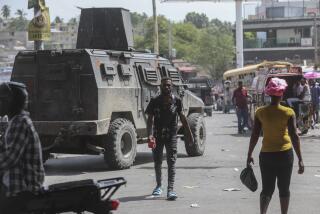U.N. Leaps Into Huge Role in Kosovo
- Share via
UNITED NATIONS — Even before the Serbian troop withdrawal from Kosovo is complete, the United Nations is moving swiftly to assume its role as the chief civilian authority in the Yugoslav province.
The magnitude of the task is enormous, ranging from feeding hundreds of thousands of people, many of them homeless, to forming a court system and police force, to nurturing all the institutions of democracy, including a free press.
This weekend, U.N. advance teams will arrive in the battle-torn province to set up mechanisms of coordination with North Atlantic Treaty Organization peacekeepers.
A convoy of trucks from the U.N.’s World Food Program is poised to enter Kosovo on Sunday to feed thousands of starving people who stayed in the province, hiding from Yugoslav forces.
“The daunting task of implementing the Kosovo peace plan has begun,” Fred Eckhard, spokesman for U.N. Secretary-General Kofi Annan, said Friday.
But officials admitted that the agreement authorizing the U.N.’s huge role in Kosovo contains numerous black holes.
“We will have to figure out a lot on the ground,” said a planner involved in one of the biggest and most difficult operations in the international organization’s history.
Annan underscored the difficulties when he addressed the Security Council on Thursday soon after it passed a resolution on the Kosovo peace plan.
“Let no one be in any doubt about the magnitude of our challenge,” he said. “After the violence, the human rights abuses, the expulsions and the devastation of the last year, the task of restoring Kosovo to a semblance of normal life is immense.”
He added that “winter is fast approaching, and we are in a race against time.”
Annan is expected to name a special representative in charge of civilian affairs in Kosovo next week; that person will work closely with the NATO general commanding the military contingent.
In effect, the U.N. representative will serve as administrator of the province with the mandate of providing an interim government under which the people of Kosovo can enjoy substantial autonomy within Yugoslavia.
The environment will be difficult, with unexploded ordnance, booby traps and mines. One of the first tasks the U.N. workers and troops face will be to discourage refugees from rushing back to their homes.
The United Nations Children’s Fund has begun distributing posters and leaflets on land-mine awareness to refugees in Macedonia.
“We, all the U.N. agencies, will go with them,” said Dennis McNamara, the top administrator in the region for the Office of the U.N. High Commissioner for Refugees. “We will take them back to their homes when it is safe and help them rebuild. . . . Our message to them is: Wait until it is safe. We are working with the security force, and we will do it together.”
Refugee agency officials expect about 400,000 refugees to return to Kosovo in the first three months. Half will require transportation assistance, they estimate.
Half the homes in Kosovo are damaged or destroyed, U.N. officials estimate. About 15,000 winterized tents are being ordered, and materials to repair as many as 20,000 houses are being procured.
More to Read
Sign up for Essential California
The most important California stories and recommendations in your inbox every morning.
You may occasionally receive promotional content from the Los Angeles Times.













